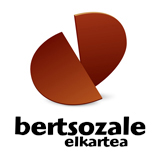Liburutegia - Fitxa ikusi Atal honi buruz gehiago jakiteko
Dengbej, Mullah, intelligentsia : the survival and revival of the Kurdish-Kurmanji language in the Middle East, 1925--1960
 Dokumentua:
Ingelesa.
Erreferentzi bibliografikoa
Dokumentua:
Ingelesa.
Erreferentzi bibliografikoa
- Egilea(k)
- Yuksel, Metin
- Izenburua
- Dengbej, Mullah, intelligentsia : the survival and revival of the Kurdish-Kurmanji language in the Middle East, 1925--1960
- Argitalpena
- Ann Arbor, United States: , 2011
- Gaiak
- Dengbêj ; Kurdistan
- Deskribapen fisikoa
- 504
- Informazio formatua
- Dokumentua
This dissertation examines the history of the Kurdish language from 1925 through the late 1950s. The study is limited to the northern dialect of the Kurdish language known as Kurmanji. The original question underlying this study is as follows: in the newly shaped post- World War I Middle East where the prevailing "international political norm" is nation-states, in the absence of a nation-state imposing Kurdish-Kurmanji as an official language, what actors kept this language alive, revivified it, and transmitted it? Based on the available and accessible oral and written sources, this study argues that oral poets called dengbêjs, mullahs educated in madrasas and Western-educated intelligentsia played crucial roles in the historical transmission of Kurdish-Kurmanji. While the prohibition and criminalization of speaking and publishing in Kurdish turns the story of this language in Turkey into one of "survival", its history may be called one of "revival" by the Western-educated intelligentsia based in Syria, Lebanon and Soviet Armenia. This study focuses on the following personalities: Dengbêj Reso (d. 1983), Khalifa Yusuf (1885-1965), Cegerxwîn (1903-1984), Celadet Bedirkhan (1893-1951), Kamuran Bedirkhan (1895-1978) and the Yezidi-Kurdish "generation of orphans" in the Soviet Armenia, namely; Qanatê Kurdo (1909-1985), Emînê Evdal (1906-1964), Heciyê Cindî (1908-1992) and Casimê Celîl (1908-1998). As Kurdish "hidden transcripts", the oral poetry of dengbêjs is characterized by its communication of sentiments. Mullahs, on the other hand, are engaged with the spread of knowledge among the Kurds in order to bring national emancipation in this world and salvation in both worlds. In comparison with the dengbêjs and mullahs, the Western-educated intelligentsia is the most publicly and politically visible category as they have been in collaboration with and/or opposition to states and colonial powers in the region. The defining characteristic of Kurdish intelligentsia, for purposes of this study, is their engagement with the project of making up a written, literary standard Kurdish language. These three categories present complicated and even contradictory visions of Kurdishness revealed within a common linguistic and historical universe. The primary sources used in this study mainly fall into three categories: archival documents (the Turkish Republican Archives in Ankara and French Diplomatic Archives in Nantes), the Kurdish press from the 1930s and 1940s ( Hawar, Ronahî, Roja Nû and Riya Teze ) and sound recordings of dengbêjs. The outstanding methodological characteristic of this study is its unconventional use of sound recordings as a historical source in a reconstruction of modern Kurdish history. The fundamental methodological claim of this dissertation is that one must listen to dengbêjs as the Kurdish "voice of the past" in order to analyze Kurdish society, culture and history on its own terms. Hence, the three audio files of Dengbêj Reso's songs are the essential and constitutive source for this study. They are not appended ; they are part of the body of the dissertation. This study offers several significant contributions to the existing scholarship on the modern Middle East in general and modern Turkey and Kurdish history in particular. First and foremost, it approaches Kurdish history through its own language. By its engagement with Kurdish history through the history of the language, this study challenges the predominant focus on the Kurds from within the framework of politics and the history of nationalism. Therefore, the focus on the language provides a more human touch in contrast to the top-down political as well as academic perspectives characterizing the Kurds solely as agents of tribal, religious and national politics. Likewise, this study underlines the agency of the mostly rural dengbêjs and mullahs alongside the Western-educated urban intelligentsia. With their alternative modes of orality/literacy as opposed to the standardized literacy of the intelligentsia, dengbêjs and mullahs have been active agents in the historical transmission of the Kurdish-Kurmanji language in their own ways. Alongside highlighting the agency of dengbêjs and mullahs, this study also demonstrates that children were active agents in the revival of the Kurdish language. Hence, these agencies bring us to a more accurate picture of Kurdish history which has been written primarily through the experiences of the Western-educated male urban intelligentsia. Lastly, this study is a contribution to the social history of modern Turkey as it contributes to rewriting the history of the period under consideration from the perspective of the criminalized Kurdish language as transmitted by dengbêjs and mullahs.
Datu-base honetan eskainitako informazioari buruz jakiteko, kontsultatu lege oharra


